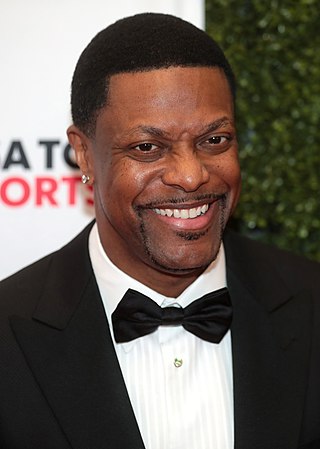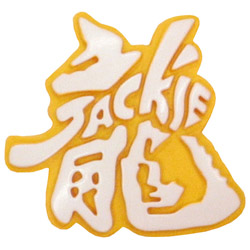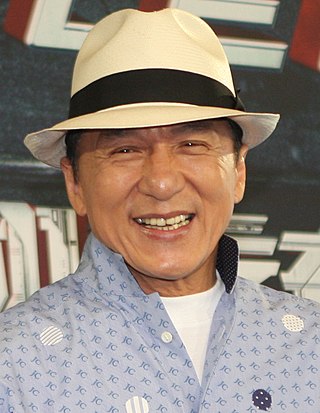
Chan Kong-sang, known professionally as Jackie Chan, is a Hong Kong actor, director, writer, producer, martial artist, and stuntman known for his slapstick acrobatic fighting style, comic timing, and innovative stunts, which he typically performs himself. Before entering the film industry, he was one of the Seven Little Fortunes from the China Drama Academy at the Peking Opera School, where he studied acrobatics, martial arts, and acting. Chan has been acting since the 1960s, performing in more than 150 films. He is one of the most influential action film stars of all time.

Brett Ratner is an American film director and producer. He directed the Rush Hour film series, The Family Man, Red Dragon, X-Men: The Last Stand, and Tower Heist. He is a producer of several films, including the Horrible Bosses series, The Revenant and War Dogs, and was an executive producer of the television series Prison Break.

Christopher Tucker is an American stand-up comedian and actor. Tucker made his debut in 1992 as a stand-up performer on the HBO comedy series Def Comedy Jam, where he frequently appeared on the show during the 1990s. He made his cinematic debut in House Party 3 in 1994, and gained greater film recognition in Friday the following year. In 1997, he co-starred in the films The Fifth Element and Money Talks, and appeared in a supporting role in Quentin Tarantino's Jackie Brown. He later gained widespread fame and popularity in the 2000s for playing Detective James Carter in the Rush Hour series, alongside Jackie Chan.

The Medallion is a 2003 action comedy film directed by Hong Kong film director Gordon Chan, screenplay written by Bennett Joshua Davlin.

Rush Hour 2 is a 2001 American buddy action comedy film directed by Brett Ratner and written by Jeff Nathanson, based on the characters created by Ross LaManna. A sequel to Rush Hour, it is the second installment in the Rush Hour franchise and stars Jackie Chan and Chris Tucker reprising their roles from the first film. The story follows Chief Inspector Lee (Chan) and LAPD Detective James Carter (Tucker), who go to Hong Kong on vacation only to be thwarted by a murder case involving two U.S. customs agents after a bombing at the American embassy. Lee suspects that the crime is linked to the Triad crime lord Ricky Tan (Lone).

Police Story is a 1985 Hong Kong action film directed by and starring Jackie Chan, who co-wrote the screenplay with Edward Tang. It is the first film in the Police Story franchise. It features Chan as Hong Kong police detective "Kevin" Chan Ka-Kui, alongside Brigitte Lin and Maggie Cheung. In the film, Ka-Kui helps arrest a drug lord, but must clear his own name after being accused of murder.

Gorgeous is a 1999 Hong Kong action romantic comedy film written and directed by Vincent Kok, and co-written and produced by Jackie Chan, who also starred in the film. The film co-stars Shu Qi, Tony Leung and Emil Chau. The film performed well at the Hong Kong box office.

Yuen Wah is a Hong Kong action film actor, action choreographer, stuntman and martial artist who has appeared in over 160 films and over 20 television series.

Rush Hour 3 is a 2007 American buddy action comedy film directed by Brett Ratner, written by Jeff Nathanson, and starring Jackie Chan, Chris Tucker, Max von Sydow, Hiroyuki Sanada, Noémie Lenoir, Yvan Attal and Youki Kudoh. It is the third installment in the Rush Hour franchise and centers on Inspector Lee (Chan) and Officer Carter (Tucker) tracking an assassin to Paris to unravel a mystery about the Chinese triads. Announced on May 7, 2006, filming began on July 4 on location in Paris and Los Angeles. Released on August 10, 2007, the film received negative reviews and grossed $258.1 million worldwide against a $140 million budget.

The Myth is a 2005 Hong Kong—Chinese martial arts fantasy-adventure film directed by Stanley Tong, starring Jackie Chan, Tony Leung Ka-fai, Kim Hee-sun, and Mallika Sherawat.

The Jackie Chan Stunt Team, also known as Jackie Chan's Stuntmen Association, is a group of stuntmen and martial artists who work alongside Jackie Chan. Founded in the 1970s, it originally included Hong Kong action stuntmen and martial artists, before expanding to include international talent over the next several decades.
Kenneth Lo Wai-Kwong, professionally known as Ken Lo, is a Cambodian-Hong Kong actor, martial artist, and stuntman. He is known for his martial arts and stunt work as a former member of the Jackie Chan Stunt Team, most notably for his antagonistic role as John in Drunken Master II (1994).

Jackie Chan began his film career as an extra child actor in the 1962 film Big and Little Wong Tin Bar. Ten years later, he was a stuntman opposite Bruce Lee in 1972's Fist of Fury and 1973's Enter the Dragon. He then had starring roles in several kung fu films, such as 1973's Little Tiger of Canton and 1976's New Fist of Fury. His first major breakthrough was the 1978 kung fu action comedy film Snake in the Eagle's Shadow, which was shot while he was loaned to Seasonal Film Corporation under a two-picture deal. He then enjoyed huge success with similar kung fu action comedy films such as 1978's Drunken Master and 1980's The Young Master. Jackie Chan began experimenting with elaborate stunt action sequences in The Young Master and especially Dragon Lord (1982).
Hwang In-shik is a South Korean actor and hapkido teacher. He is known for his work in various Hong Kong martial arts films such as Bruce Lee's Way of the Dragon, Jackie Chan's The Young Master and Angela Mao's Hapkido. He was awarded a 10th degree black belt, the highest rank possible in the art, by the World Hapkido Association.

The Rush Hour franchise is a series of American action comedy films created by Ross LaManna and directed by Brett Ratner with both Jackie Chan and Chris Tucker in leading roles. All three films center around a pair of police detectives, Hong Kong Chief Inspector Lee (Chan) and Los Angeles Police Detective James Carter (Tucker), who go on their series of misadventures involving corrupt crime figures in Hong Kong and Los Angeles. The films incorporate elements of martial arts, humor, and the buddy cop subgenre. The films were released theatrically from 1998 to 2007, attaining commercial success, but critical reception was mixed.
Cheung Wing-fat, also known as Mars, is a Hong Kong actor, action director, stuntman and martial artist. He is one of Jackie Chan's best friends.

Gen-Y Cops is a 2000 Hong Kong science fiction action film directed by Benny Chan and starring Edison Chen, Stephen Fung and Sam Lee. The film is a sequel to the 1999 film Gen-X Cops.

The 2012 Mnet Asian Music Awards took place on November 30, 2012, at Hong Kong Convention and Exhibition Centre in Hong Kong. The ceremony was the third consecutive Mnet Asian Music Awards to occur outside of South Korea. It was reported by international news agencies such as Agence France-Presse, ITN, and was also broadcast in 85 countries around the world.

Skiptrace is a 2016 Hong Kong-Chinese-American buddy cop action comedy film directed by Renny Harlin, produced, starring and based on a story by Jackie Chan. The film co-stars Johnny Knoxville and Fan Bingbing. It was released in China on July 21, 2016 and in the United States on September 2, 2016.

Rush Hour is an American police procedural comedy-drama television series developed by Bill Lawrence and Blake McCormick that is based on the film of the same name. Similar to the films, the series follows Detective Carter, a radical LAPD detective, and Detective Lee, a by-the-book detective from Hong Kong, as they are forced into an unlikely partnership. CBS placed a series order on May 8, 2015. The show premiered on March 31, 2016.

















